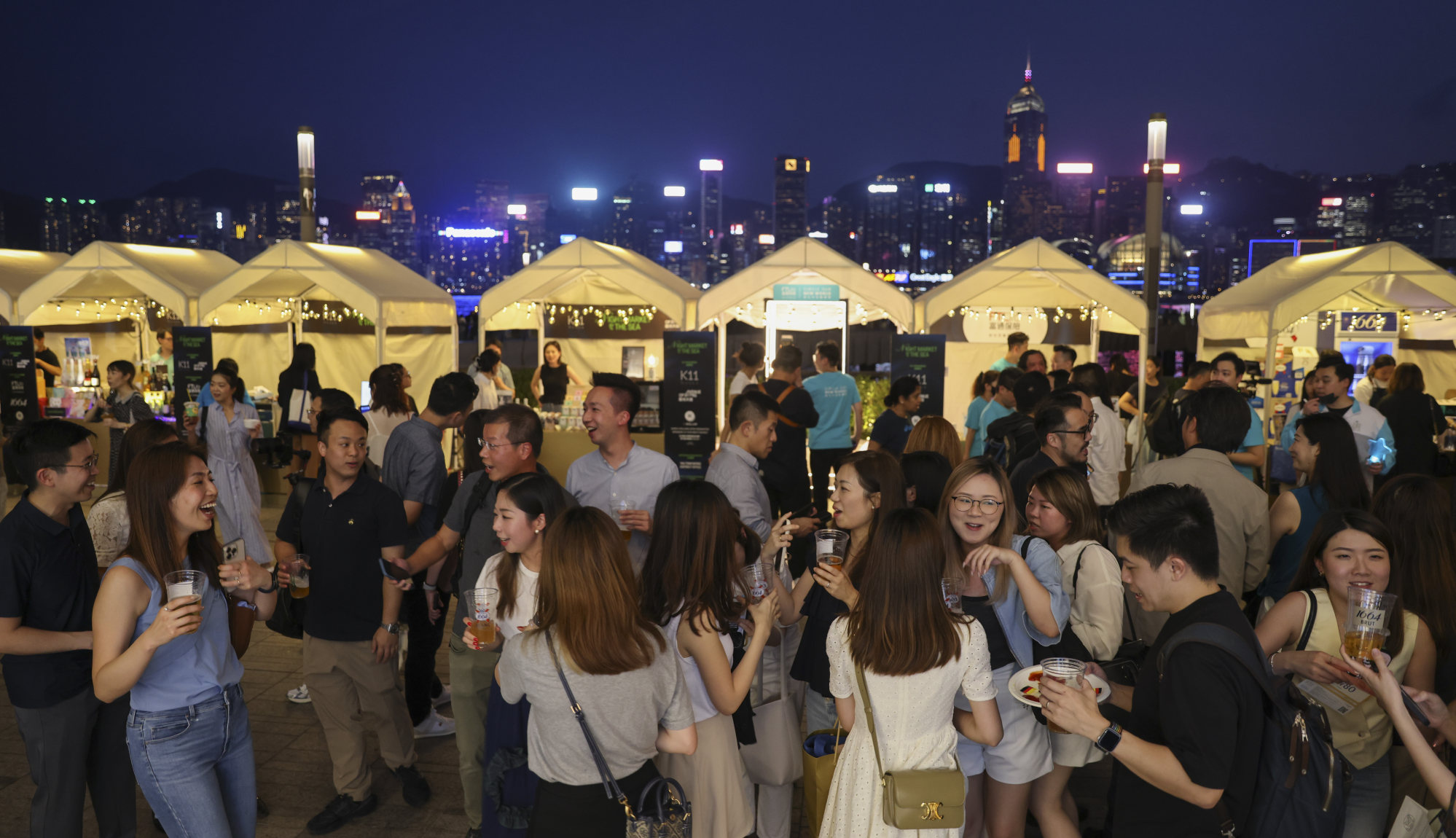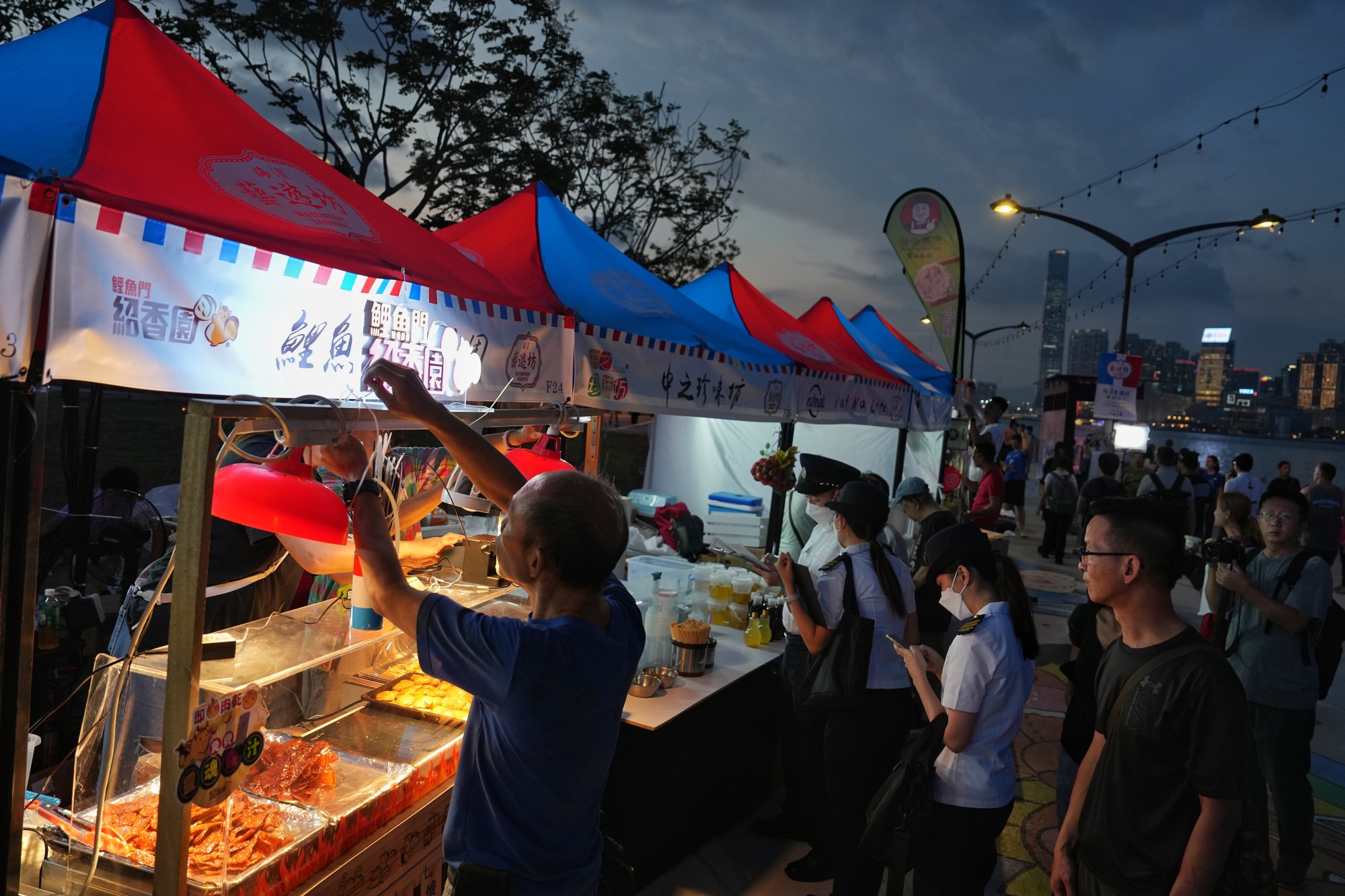A second wave of weekend night bazaars in Hong Kong is up in the air as Typhoon Koinu looms, posing another stumbling block to the government’s bid to revitalise nightlife.
Authorities said in an email to Wan Chai Carnival vendors on Wednesday they would cut off electricity to the event this weekend if a No 3 warning signal was issued. Market marquees would also be taken down under a No 8 alert.
“Therefore, stall owners are advised to pay attention to the Observatory’s reports and take corresponding measures,” the message, seen by the Post, said.
Do you have questions about the biggest topics and trends from around the world? Get the answers with SCMP Knowledge, our new platform of curated content with explainers, FAQs, analyses and infographics brought to you by our award-winning team.

The Development Bureau also warned weekend events might be affected by a typhoon and that the market might be “adjusted, shortened or cancelled”.
The Observatory issued a No 1 standby warning on Wednesday night.
Typhoon Koinu is expected to come within 500km (310 miles) of the city on Thursday.
But according to the Observatory’s latest forecast, the typhoon is gradually weakening under the influence of the northeast monsoon and is expected to move westwards towards the Pearl River Delta over the weekend.
A higher warning signal would depend on the speed of the weakening storm and its distance from the estuary, the forecaster said on Thursday morning, adding the city might experience gusts and showers with strong northerly winds over the weekend.
Davi Poon, organiser of the night bazaars at Kennedy Town, earlier already pledged to postpone the market for safety reasons if the No 3 signal was issued because marquees could be blown away by strong winds.
“We are all very disappointed and hope that the typhoon will not reach Hong Kong as the momentum from last weekend was very good,” he said.
The waterfront bazaar last weekend saw more than 20 live bands performing and vendors earned 30 to 40 per cent more than expected, Poon added.
The unpredictable weather also meant some vendors did not want to be involved in the market’s second phase. One vendor who was part of the Wan Chai market’s initial run, and who asked not to be identified, said: “Of course [we don’t want to join the coming round]. There’s a typhoon.”
The night market along the Wan Chai harbourfront – one of three flagship events under the government’s “Night Vibes Hong Kong” campaign, ended its first six days of operation on Monday.
The campaign will run in several stages until early next year.
Retailers say foot traffic up as ‘Night Vibes Hong Kong’ campaign gathers pace
Chief Executive John Lee Ka-chiu said before his weekly Executive Council meeting on Tuesday that after-dark events during the National Day weekend were “well-received” and the results were “satisfactory”.
An estimated 100,000 people took part in night events under the campaign, designed to boost the economy, over the three-day holiday, Lee said.
The Development Bureau later on the same day said new phases of the waterfront bazaars would be held every weekend in October and November.
The night markets’ launch faced teething troubles, such as an unstable power supply, while some critics doubted the bazaars would deliver a long-term boost to the economy.
Hong Kong Observatory issues T1 warning signal as Typhoon Koinu edges closer
Vendors complained of flickering lights and a lack of electricity, despite some having paid extra for more supply. Some even saw their businesses crippled because they did not have a working stove or point-of-sale payment machines.
Secretary for Development Bernadette Linn Hon-ho disagreed with claims that the night markets were taking over too much of the promenades and that leisure space for Hongkongers on weekends had been reduced.
“Different waterfront venues will take turns to hold night markets in October and November,” she told a media briefing on Wednesday. “We believe our waterfront can be used for different purposes, like for music shows and sports. We can find out Hongkongers’ preferences by holding a variety of events in these two months.”
The Wan Chai Waterfront Carnival will be staged every weekend this month, with activities including live music, traditional craft workshops and movie screenings.
Hong Kong will review nightlife campaign feedback, propose new ideas: Paul Chan
Ivan Wong Wang-tai, chairman of the Wan Chai District Council, said it was too early to tell whether the night bazaars could boost Hong Kong’s economy simply based on results from the past weekend, noting turnout was enhanced by the National Day fireworks display.
“The success of the night bazaars should not be measured solely by economic factors, but by social ones, as they managed to get more visitors to the waterfront,” he said. “But how much money can a night market earn? We should focus on how to fundamentally improve our economy, through hi-tech manufacturing and finance for example, instead of relying on this.”
In Kennedy Town, an eco-themed flea market is set to take place this weekend, while coming events include a Halloween cosplay party and a pet-themed market.
“We have received more than 500 applications for the second phase of the bazaar when we only have 70 stalls available,” organiser Poon said.
He has been holding weekend markets at Belcher’s Bay since 2021 and collaborated with the government on the Kennedy Town bazaar last weekend, when vendors received subsidised rent.
“Complaints about noise are still our biggest challenge, although we limited our live band performances to before 10pm and faced the speakers away from residential areas,” he said.

Over in Kowloon, the Kwun Tong promenade will host three more night bazaars in October and November, with themes such as a Halloween pets night and a K-pop dance party.
Bill Tang Ka-piu, a district councillor of Kowloon East, backed the idea of turning the night bazaars into a permanent feature for the area by 2025.
“Kwun Tong is a bustling commercial district, with thousands of people working there who can visit the waterfront after work, unlike in Wan Chai and Kennedy Town,” he said. “Its location is actually beneficial for us, as it is closer to industrial buildings and far away from residential areas, reducing concerns about noise.”
Compared with the Wan Chai promenade, where nearly half of vendors sold cooked food, Tang said only three out of the 50 stalls in Kwun Tong sold fare such as pizza and hot dogs, which lacked uniqueness, he argued.
Poon warned that night markets were by design not able to offer small businesses the chance of making quick money.
“People are saying that night bazaars can’t make money. But the point of these markets is to help small businesses reach a wider audience, which is more important than driving the economy,” he argued.
“If we can make these markets permanent and turn them into a tourist attraction, we can use them as a platform to promote Hong Kong brands to tourists, which I think is more meaningful.”
More from South China Morning Post:
- Hong Kong’s night scene: a tour of city’s evening hotspots reveals what’s hot and what’s not as consumers weigh in on what will get it alive and kicking again
- Hong Kong will review feedback on nightlife campaign and offer new ideas, finance chief says, as city leader admits spending habits take time to change
- Typhoon Koinu: Hong Kong’s No 1 warning signal to remain in force for most of Thursday
For the latest news from the South China Morning Post download our mobile app. Copyright 2023.





